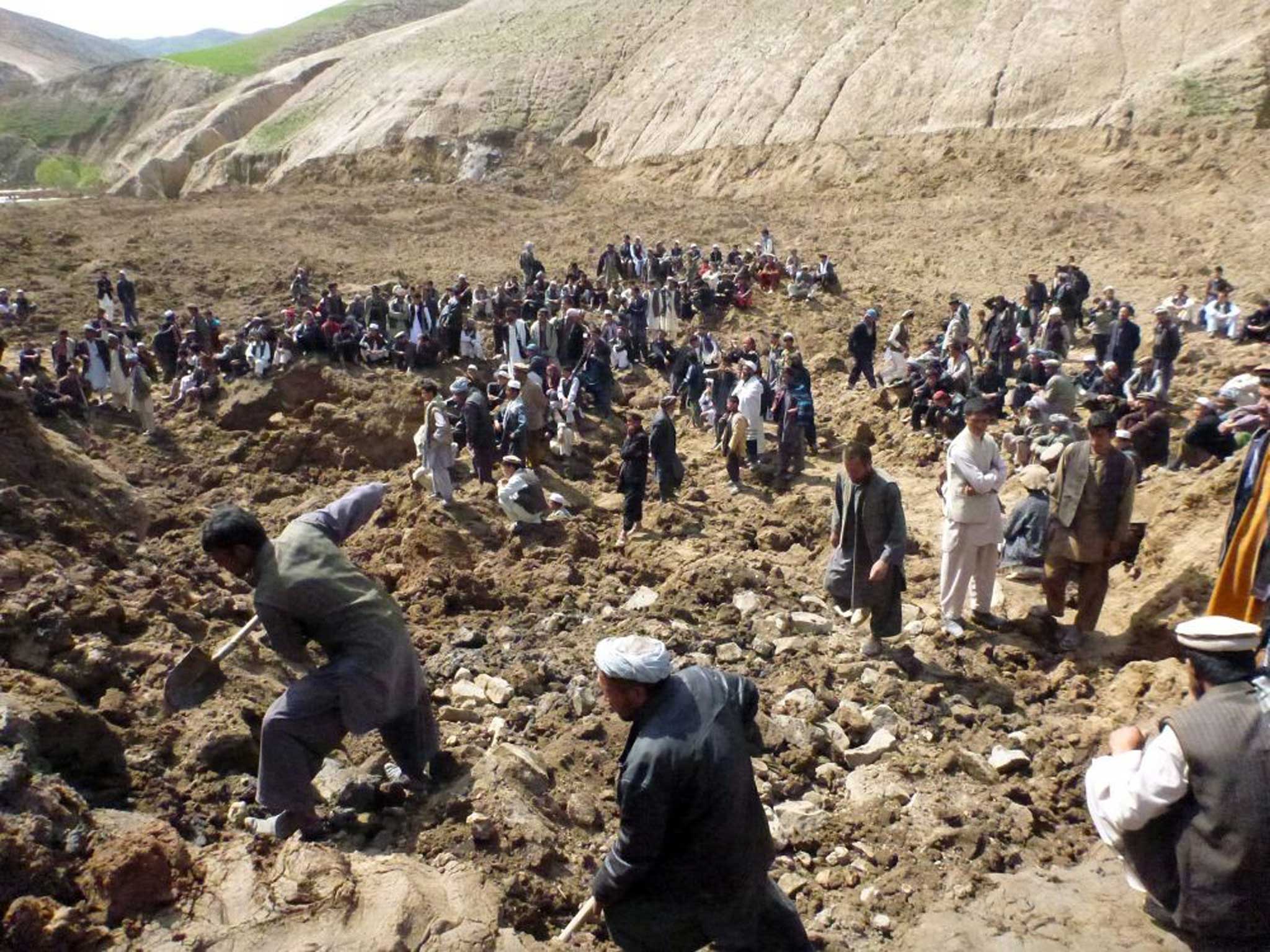Afghanistan landslide: Families told to expect no more survivors to emerge from the mud
One of the country's biggest natural disasters kills up to 2,700, as rescuers turn focus to the thousands of people displaced

Relatives of up to 2,700 people missing in one of the biggest natural disasters in Afghanistan's history were warned yesterday to expect no more survivors to emerge from a landslide, with officials declaring that the site will become a mass grave.
Rescuers spent the day digging in a desperate attempt to find survivors or bodies of relatives buried metres under the mud. Many used shovels or even their hands as conditions in the remote Badakhshan province, in the north-east of the country, made the movement of large machinery difficult. A fear of further landslides also hindered rescue attempts.
Days of torrential rain in the region caused a section of a mountain to collapse on to the homes in Abi Barak on Friday morning. As rescuers rushed to help those affected, they were killed by a second mudslide. Up to 300 homes were said to have been buried. The mountainous terrain of the region has made it prone to such disasters.
Estimates of the number of dead vary, reflecting the difficulty in getting reliable information from such a remote location The figures ranged from 255, given out by Mohammad Karim Khalili, one of Afghanistan's vice presidents, through to 2,700 from the International Organisation for Migration, which cited information they had gathered from provincial figures and community leaders. Naweed Forotan, a spokesman for the Badakhshan provincial governor, said that more than 2,100 people had died from 300 families.
"That will be their cemetery," said Mr Khalili, who visited the scene yesterday, a sentiment that was echoed by other officials.
The provincial governor, Shah Waliullah Adeeb, said: "We cannot continue the search and rescue operation any more, as the houses are under metres of mud. We will offer prayers for the victims and make the area a mass grave."
One woman in the village, Begam Nesar, said that 13 of her family members were under the mud. They included her mother, father, brothers, sisters and children. She said she had been visiting relatives at a nearby village when the disaster struck.
In pictures: Afghanistan landslide
Show all 8Ari Gaitanis, a spokesman for the United Nations Assistance Mission in Afghanistan, said that attention was now turning to more than 4,000 people from 700 families displaced by the disaster, who have lost their homes or have been told to leave their villages due to the risk of further landslides. Emergency tents have been set up, with some families already having spent Friday night without shelter.
"Groups are trying to get supplies to these 4,000-plus people, keeping in mind that this region is pretty mountainous. Access is possible, but it is not the type of access that means we can bring in heavy lorries and other machinery," Mr Gaitanis said.
The United Nations Office for the Co-ordination of Humanitarian Affairs was helping to co-ordinate the delivery of supplies, from food and water through to medical supplies and emergency shelter. British charities are also mobilising teams to the area. The health charity Merlin, part of Save the Children, has sent five ambulances to the area, while other charities, including Oxfam, are expected to start providing relief.
Justine Greening, Secretary of State for International Development, expressed her "deepest sympathies to those affected by the tragic landslide" and said the UK was ready to assist. "The UK is closely monitoring the situation and stands ready to provide further assistance as needed. Our recent £10m support to the UN's Common Humanitarian Fund will ensure additional relief supplies can be delivered as required," she said.
International troops are also standing ready to lend a hand. Lee Litzenberger, Nato's senior civilian representative, said: "The priority now is to save as many lives as possible. This is the second natural disaster in a week in Afghanistan to cause substantial loss of life and destruction of Afghan homes and villages [following recent flooding]. Nato has always stood by its Afghan partners, and we will do so now as they respond to this tragedy."
Subscribe to Independent Premium to bookmark this article
Want to bookmark your favourite articles and stories to read or reference later? Start your Independent Premium subscription today.

Join our commenting forum
Join thought-provoking conversations, follow other Independent readers and see their replies